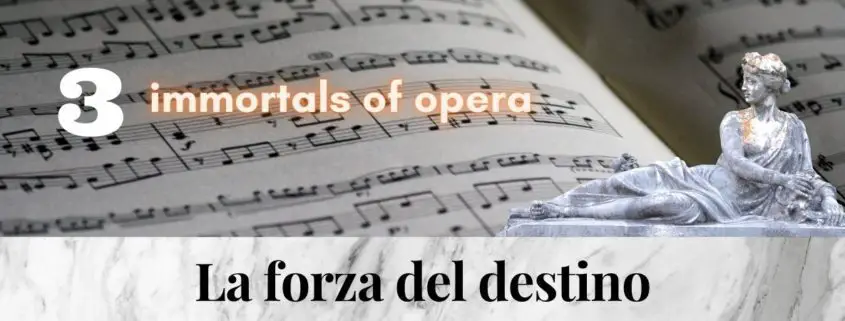La forza del destino is one of three Spanish operas (Don Carlo, Forza del destino, Il Trovatore) by Verdi, all of which enter the heroic-historical world of the grand opéra. It can justifiably be counted among the great works of Verdi. The many magnificent duets between Alvaro and Caro, the religious scenes of Leonora and the colourful supporting roles of Preziosilla, Guardiano and Fra Melitone characterise this opera. Verdi’s musical themes are grandiose and he uses them as leitmotifs throughout the opera for the first time.
Leonora’s great Prayer
On a rock next to a monastery. Exhausted, Leonora arrives in men’s clothes. She had secretly listened to her brother in the inn and learned bitterly about Alvaro’s alleged escape to America. She wants to repent at the monastery.
With “Madre pietosa Vergine” Verdi again writes a great, religious aria for this scene of Leonora. Leonora is in a state of highest excitement, which Verdi first creates with the introductory motif of the strings, which imitates the excited throbbing of her heart. Her exitment further increases with the tremolo of the strings and the background chorus of the monks.
Verdi created a particularly beautiful effect by composing the first section in a minor key, and by having the first heavenly and hymnic “Deh non m’abandonar” changed to the major parallel, thus giving confidence to Leonora’s supplication.
We hear this scene of Leonora in the interpretation by Maria Callas. It is unique how she can create the excitement of Leonora at the beginning with a slight tremolo in her voice and then how she changes into the “Deh non m’abandonar”. Grandiose how she shapes her voice in the duet with the choir of the monks.
Madre pietosa vergine – Callas
The great duets of Alvaro and Carlo
Noise is coming from the soldiers. Alvaro rushes to the assistance of an officer who has been attacked by cardsharpers. It’s Carlo, who was also hired under a false name. The two become friends, but they do not know their respective real identity. The troops are under attack. Don Alvaro leads his troops in the battle and is seriously wounded and brought to the sick bay. Don Carlo is with him. He promises him the Order of Calatrava for his bravery. When Alvaro hears the name, he cringes and gives Carlo a key with the request to burn the contents of the box with its secret in case of his death. Moved, they say goodbye and Alvaro is taken to the surgeon.
This duo is one of Verdi’s most beautiful duets for baritone and tenor. It is the almost tender scene of two men, who will shortly afterwards try to kill each other. This part is also very reservedly orchestrated, making the long lines of the singing voices intensively audible.
Caruso himself declared this piece to be his best duet recording. In fact, this interpretation of the two Neapolitans received reference status. Both voices harmonize to the highest degree and exude a velvety softness in the most beautiful legato.
Solenne in quest’ora giurarmi dovete (2) – Caruso / Scotti
Leonora’s great prayer “Pace, pace, mio dio”
Pace, pace is Leonora’s prayer, her plea for peace, which she will not achieve on earth and longs for her death (“Oh God, let me die”). Hardly any other aria lets the desperation of a woman feel so directly, and it offers the singer many opportunities to captivate the listener.
It begins with a shattering cry “Pace” (“Peace”), with a swelling sound, it must sound full of warmth and despair and immediately seize the listener.
Her voice is accompanied by sighing wind instruments and the harp. In addition to the piano parts of the first part, the angelic (written in pianissimo!) high Bb in the middle part and the dramatic “maledizione” at the end form the great highlights of this aria.
In the role of Leonora and the “pace, pace” Renata Tebaldi was possibly unrivalled. Her angelic piano turns this aria into a monument and is one of the most beautiful recordings of this great singer.
Pace, pace mio Dio – Tebaldi







Leave a Reply
Want to join the discussion?Feel free to contribute!